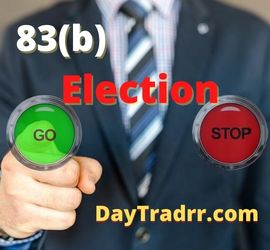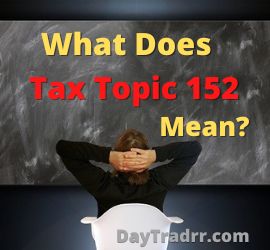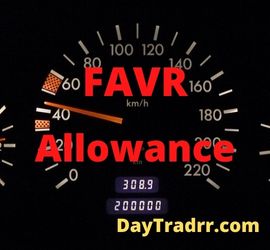What Is a Section 83(b) Election?
 A Section 83(b) election is a request that the IRS recognizes income and levy income taxes on acquired company shares at the time they are granted rather than later when they are vested. The 83(b) election is a provision of the Internal Revenue Code (IRC). It allows an employee or startup founder to pay taxes on the fair market value of restricted company stock. However, taxes are calculated at the time the stock is granted rather than the time it is fully vested.
A Section 83(b) election is a request that the IRS recognizes income and levy income taxes on acquired company shares at the time they are granted rather than later when they are vested. The 83(b) election is a provision of the Internal Revenue Code (IRC). It allows an employee or startup founder to pay taxes on the fair market value of restricted company stock. However, taxes are calculated at the time the stock is granted rather than the time it is fully vested.
When you make an 83(b) election, you ask the IRS to record income and collect income taxes on the acquisition of company shares when they are given, rather than later when they vest. The grant date is the day on which an employee receives a stock or stock options reward from the corporation. Vesting signifies that an employee has achieved actual ownership of the company’s shares or stock options. Usually, this is done by completing a specified time period of working.
Section 83(b) Election – A Closer Look
The 83(b) election pertains to equity in company stock that is still subject to vesting. It instructs the Internal Revenue Service (IRS) to tax the elector for ownership at the time of issuance. This is as opposed to the time of the stock actually vesting. The 83(b) election documentation must be submitted to the IRS within 30 days of issuing restricted shares. The receiver of the equity must also provide a copy of the completed election form to their employer. This is in addition to notifying the IRS of the election.
An 83(b) election effectively means that you pre-pay your tax burden based on a low valuation. Of course, this assumes that the equity value grows in subsequent years. There are instances where a company’s value persistently and continuously decreases. In that instance, you would have overpaid in taxes by pre-paying on a higher equity valuation. A founder or employees often receive remuneration as stock in a company. Invariably, the stake is subject to income tax based on its worth. Moreover, the tax liability is based on the fair market value at the moment of grant or transfer. In that case, the tax must be paid in the year in which the stock is issued or transferred.
However, in many circumstances, the individual obtains equity in company stock that vests over time. Employees are encouraged to stay with the company for a long time while their shares vest. In that instance, the tax on the equity value is required at vesting. If the worth of the company rises during the vesting term, so will the tax paid during each vested year.
Section 83(b) Election
You may, however, accelerate the date on which the Restricted Shares are subject to ordinary income rates, and therefore the date in which all appreciation in value will be taxed as capital gain, by filing a Section 83(b) election. This election must be made within 30 days after the date of issuance of the Restricted Shares. If a Section 83(b) election is made for the Restricted Shares, then the amount of taxable income will be calculated, and tax will be owed at ordinary income rates. The amount of taxable income will be equal to the number of Restricted Shares received in the Exchange Offer multiplied by the market price per share on June 26, 2009 (i.e., on the date of issuance).
Your adjusted tax basis in the shares will be the amount recognized as ordinary income on the date of issuance, and the holding period for the shares will begin just after the issuance date. Any gain or loss you recognize when you sell the Restricted Shares that have vested will be long-term capital gain or loss. Any dividends received with respect to Restricted Shares prior to 2011 for which a Section 83(b) election is made may be qualified dividend income subject to a current maximum federal tax rate of 15 percent, provided certain other requirements are satisfied. (Source: sec.gov)
Example – 83(b) Election versus No Election
Assume you receive 100,000 shares subject to vesting. The shares are worth $.01 per share at the time of award and $2.00 per share at the time of vesting. The value grows to $10.00 per share when sold more than one year later. Also, assume you’re liable for ordinary income taxes of 40% and a federal long-term capital gains tax rate of 20%.
Example 1 – Election
When initially granted, your shares are worth $1,000 (100,000 x $.01). You timely file a Section 83(b) election within 30 days of the restricted stock issuance. You pay $400 in ordinary income tax (i.e., $1,000 x 40%). Because you made a Section 83(b) election, you have no further tax due when the stock fully vests. You only have to pay tax when you sell the stock. Upon selling the stock a year later, you recognize a taxable gain of $9.99 per share. The value is not $10.00, because you get credit for the $.01 per share you already realized as income. However, you pay a capital gains tax of $199,800 [(100,000 x $9.99 = $999,000) x 20% = $199,800] on the sale . This occurs more than one year after the date of grant. After taxes, your economic benefit is $799,800.
Example 2 – No Election
You do not file a Section 83(b) election in this case. So you pay no tax at grant since the shares are unvested. However, you recognize $200,000 in revenue when the shares vest, resulting in $80,000 in ordinary income tax. When you sell the shares, you recognize a taxable gain of $8.00 per share. Not $10.00, because you get credit for the $2.00 per share you already recognized as income. You pay a capital gains tax of $160,000 ($800,000 x 20%) on the sale which occurs more than one year after the date of vesting. [($1,000,000 – $80,000 = $920,000) – $160,000 = $760,000]. After taxes, your economic benefit is $760,000
So in the above example, filing a Section 83(b) election would have saved you $39,800.
Tax Strategy
The 83(b) election allows the employee to pay taxes on the equity before the vesting period begins. In the above example, this tax method will only necessitate paying tax on the book value of $1,000. The 83(b) election informs the IRS that the elector has chosen to report as taxable income the difference between the amount paid for the stock and its fair market value. The share value during the vesting period is irrelevant. This is because the employee will not pay any additional tax and will be able to keep the vested shares. If the shares are sold for a profit, however, a capital gains tax will be levied.
Reasons NOT to Take Section 83(B) Election
Section 83(b) elections are beneficial. However, there are instances where the election might not work out so well. If you receive restricted stock worth a nominal amount, it virtually always makes sense to file one.
- Immediate tax consequences – What if instead of receiving 100,000 shares of restricted stock worth $.01 per share, you received 100,000 shares of restricted stock worth $5.00 per share? Filing a tax code Section 83(b) election would immediately cause you tens of thousands of dollars of tax. And if the company subsequently fails, and in particular if it fails before your stock vests, you likely would have been economically better off to not have filed a Section 83(b) election.
- Share value declines – What if the equity value falls or the company files bankruptcy after the 83(b) election was triggered? In that case, the taxpayer overpaid in taxes for shares with a lesser amount. Unfortunately, the IRS does not allow an overpayment claim of taxes under the 83(b) election.
- Employee departs before vesting – What if the employee departs the company before the vesting period is completed. This is another situation in which an 83(b) election may be a disadvantage. The employee would have paid taxes on shares they would never obtain in this situation. Furthermore, if the amount of reported income is considerable at the time of the stock grant, filing for an 83(b) election makes little sense.
Frequently Asked Questions
When Is It Beneficial to File 83(b) Election?
An 83(b) election allows recognizing the tax liability on the complete fair market value of the restricted shares. Taxes are paid in advance of vesting at the time of grant. It is only advantageous if the restricted stock’s value rises in the following years. In addition, if the amount of income reported at the time of granting is minor, an 83(b) option may be advantageous.
When Should you NOT File 83(b) Election?
If an 83(b) election is filed with the IRS and the equity value decreases or the company declares bankruptcy. In that circumstance, the taxpayer will have overpaid in taxes for shares that are worthless. Unfortunately, the IRS does not permit a tax overpayment claim under the 83(b) election. Another example is if an employee leaves the company before the vesting period is complete. Submitting an 83(b) election would be counterproductive. This is because they would have paid taxes for shares they would never receive. Furthermore, if the amount of reported income is significant at the time of the stock grant. This could result in a significant tax bill. Therefore, filing for an 83(b) election makes little sense.
What Is Profits Interest? Is a Section 83(b) election required?
A profits interest is an equity right granted to an individual for their service to a partnership. It is based on the future value of the partnership. The reward consists of obtaining a percentage of a partnership’s profits without having to provide any capital. It is a sort of equity pay that is used to incentivize personnel. Often, it is implemented when monetary remuneration may be difficult due to limited funding. For example, with a start-up limited liability firm (LLC). Normally, an 83(b) election is required for this form of worker compensation.
Up Next: What Is Autocorrelation?
 Autocorrelation is a statistical representation of the degree of correlation between the same variables measured at successive time intervals. Correlation indicates the strength of a linear relationship between two variables. Whereas, autocorrelation measures the strength of a linear link between time series lagged values. It measures the degree of similarity between a particular time series and a lagged version over subsequent time intervals. Autocorrelation is theoretically similar to the correlation between two different time series. However, it employs the same time series twice. Once, in its original form and once lagged by one or more time periods.
Autocorrelation is a statistical representation of the degree of correlation between the same variables measured at successive time intervals. Correlation indicates the strength of a linear relationship between two variables. Whereas, autocorrelation measures the strength of a linear link between time series lagged values. It measures the degree of similarity between a particular time series and a lagged version over subsequent time intervals. Autocorrelation is theoretically similar to the correlation between two different time series. However, it employs the same time series twice. Once, in its original form and once lagged by one or more time periods.
Consider a pattern in a series of numbers. Moreover, the values in the series can be predicted based on previous values in the series. In that case, the series of numbers is said to display autocorrelation. This is also referred to as serial correlation and serial dependence. The auto component of autocorrelation comes from the Greek word for self. Therefore, autocorrelation refers to data that is associated with itself rather than with other data. When it comes to investment, a stock may have a large positive autocorrelation in its returns. This implies that if it is “up” today, it is more likely to be “up” tomorrow as well. Naturally, autocorrelation can be a beneficial tool for traders, especially technical analysts.




